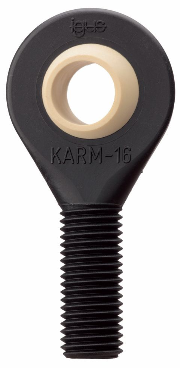 The introduction of the new Machinery Safety Directive has made the requirement for MTTF – mean time to failure – even more pressing. Rob Dumayne, director of igus, examines the need for machine and component reliability, and explains how polymer bearings can help thanks to their predictable operating lives and wear characteristics
The introduction of the new Machinery Safety Directive has made the requirement for MTTF – mean time to failure – even more pressing. Rob Dumayne, director of igus, examines the need for machine and component reliability, and explains how polymer bearings can help thanks to their predictable operating lives and wear characteristics
Despite frequently being used when discussing the reliability of machines and components, the term ‘mean time to failure’, or MTTF, is often poorly understood. It is, however, simply a statistical measure that allows the quality and durability of similar machines or components to be compared.
While it is useful when assessing maintenance requirements and for calculating the expected life of a component or machine, it is not a reliable predictor of how long any individual component or machine will function before it breaks down.
With reliability a concern for all users of machines and components, MTTF has always been an important measure. Its importance, however, has been brought into even sharper focus by the Machinery Safety Directive, the latest version of which, 2006/42/EC, came into force at the end of 2009. This lays down essential requirements for all machines and combinations of machines that are supplied and used in Europe.
Meeting directives
It is initially the responsibility of machine suppliers to ensure that the provisions of this Directive are met. However, Regulation 10 of PUWER (the Provision and Use of Work Equipment Regulations) requires that an employer must ensure that any equipment subject to European Directives complies with all applicable Essential Health and Safety Requirements (ESHRs) of the Directives that apply to it. In other words, employers also have a responsibility to ensure compliance with the Machinery Safety Directive.
The provisions of the Directive are wide ranging, but one area of particular interest is Section 1.3, which deals with protection against mechanical hazards.
The Directive imposes obligations to predict the wear and life of components used in machines, and accurate MTTF data is key for this. Such data is particularly important in relation to traditional bearings, as these most often fail catastrophically, giving rise to potential safety hazards. But, MTTF data is based on statistical analysis and therefore indicates only the average time to failure. By the very nature of averages, this means that some items will fail sooner than the MTTF.
So, for any machine or component the MTTF is a poor indicator of when the next failure will occur. Nevertheless, this data is the only valid way of comparing the quality and durability of conventional bearings. A further complication with these bearings, however, is that operating life and reliability don’t depend only on their quality, but are also influenced by many external factors – such as the presence of contaminants and the level of lubrication.
When it comes to the bearings, polymer versions can help with this.
Polymer bearings
Polymer bearings are self-lubricating, which means that their useful life is not influenced by the provision or absence of external sources of lubrication, and they are unaffected by the presence of contaminants. They are also resistant to corrosion and chemical attack, and they offer a constant low coefficient of friction.
One of the biggest benefits, however, is that they don’t ‘wear out’ in the conventional sense, and they almost never suffer catastrophic failure. Instead, their life is determined solely by the amount of wear that is acceptable before replacement is advisable, a commonly adopted figure for plain bearings being 0.25mm. Note that even when this end-of-life condition is reached, the bearing has not failed – it is still working but with greater clearance.
The data igus uses as the basis for life calculations relating to polymer bearings has been determined over thousands of tests, and the results provided by the calculations are accurate and reliable, rather than being statistical estimates. In other words, when high quality polymer bearings are used, designers and machine users are freed from the problems associated with MTTF data for conventional bearings. Instead, they have attained the Holy Grail of working with real-world, end-of-life data that is truly meaningful and reliable.
The Machinery Safety Directive and PUWER mean that reliability is a key issue for everyone who specifies, designs, supplies, works with or maintains machines. But while reliability is notoriously difficult to quantify accurately, polymer bearings, with their predictable operating lives and wear characteristics, make this task much easier and much more manageable.
igus


